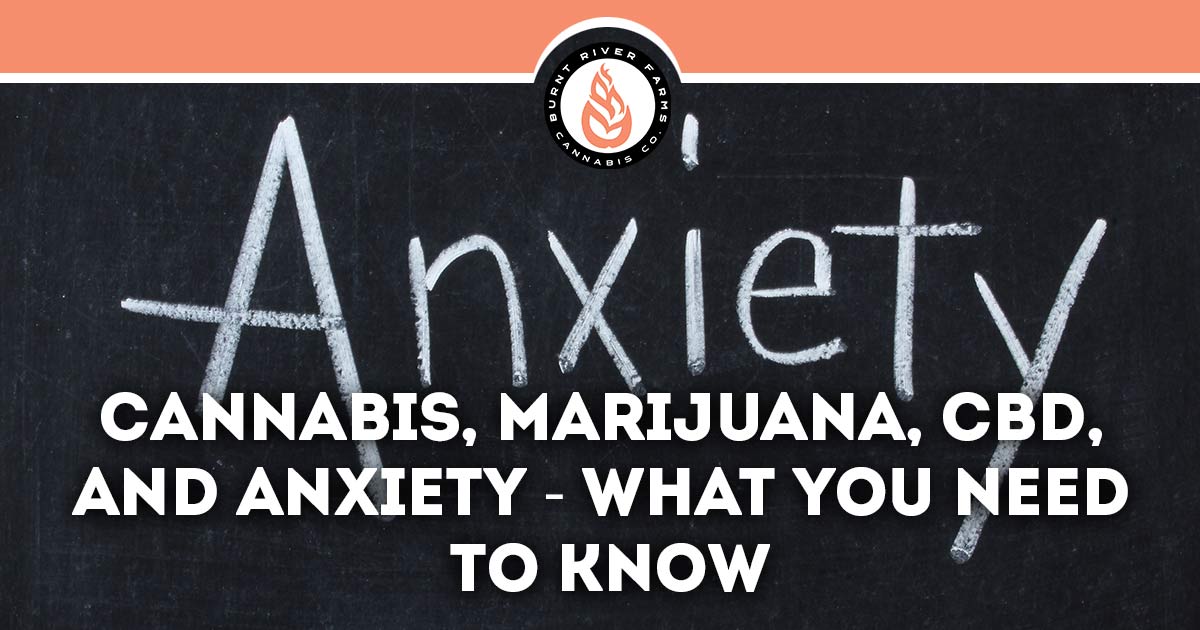Cannabis, Marijuana, CBD, and Anxiety - What You Need to Know

Across the country, most states have legalized cannabis, or at the very least CBD in some capacity. Doing this has opened up a whole new set of treatment options for people who suffer from panic attacks and anxiety disorders. With anxiety affecting over 30% of adults, it is one of the most prominent mental health conditions plaguing our country. CBD, known more formally as cannabidiol, is a compound found in Cannabis Sativa plants. It is non-psychoactive, unlike THC, and may provide viable treatments for anxiety.
Anxiety Disorder
There are several types of anxiety. Some people may suffer from one type of anxiety while others may suffer from multiple forms (i.e., social anxiety, social phobia, post-traumatic stress, generalized anxiety, stress disorder, anxiety-like behaviors, panic disorder, and other anxiety symptoms). It can be completely debilitating, harming personal and professional relationships, making it difficult to leave the house or get through the day. Finding the right anxiety treatment to help can be a difficult task. In fact, of all of the people who suffer from some form of anxiety, only about 1/3rd of them receive effective treatment. Much of this can be attributed to misdiagnosis or underdiagnosis, as well as a lack of access to health care, and even aversions to many conventional treatment options.
Research into using cannabis for the medical treatment of anxiety disorders is showing promising results to reduce anxiety symptoms. In fact, anxiety is near the top of the list for approved conditions for those states allowing the medical use of marijuana as both a first-line and adjunct therapy option to significantly reduce anxiety responses.
Anxiety, and the Endocannabinoid System
Anxiety is a physiological and emotional reaction to a perceived threat. Most characterize it as anything from an uneasy feeling to one of panic. In many cases, the response can interfere with a person’s ability to lead a normal life. However, symptoms tend to vary from person to person. They can be chronic or episodic, and, if untreated, anxiety can not only disrupt daily life but lead to physical illness.
When the brain identifies a threat, no matter how minor, it releases cortisol, adrenaline, and other neurotransmitters. The constant exposure to these chemicals can lead to difficulties concentrating, panic attacks, weight gain, depression, and even suicide. Anxiety also can lead to high blood pressure, heart palpitations, a weakened immune system, digestive issues, and more.
The endocannabinoid system (ECS) was discovered nearly 30 years ago. This system performs various tasks to help keep the environment (your body) in a state of stability despite outside influences. This includes helping regulate food intake, perception of pain, energy expenditure, inflammation, cognition, mood, as well as stress responses including anxiety. Cannabis helps the ECS better regulate these functions, making it an excellent treatment option for anxiety and other stress-related issues.
CBD: A Multi-Targeted Approach to Treatments of Anxiety
As of right now, Cannabidiol (CBD) and tetrahydrocannabinol THC are the most studied cannabinoids from cannabis. These compounds bind to cannabinoid receptors in the brain that are part of the ECS. THC provides the “high” feeling while CBD does not.
The effect of CBD has shown to have many beneficial pharmacological effects including anti-inflammatory properties, helping to reduce seizures, helping with anxiety disorders, and to reduce anxiety. In fact, there is evidence that CBD for anxiety is an effective treatment option for numerous anxiety disorders including GAD, PTSD, PD, OCD, and SAD.
What Does Research Say About CBD and Anxiety?
A New Zealand study of nearly 400 adults looked at participants who were receiving a medical dose of CBD for various ailments. All groups reported improvement in their quality of life after only 3 weeks of treatment. Those who were being treated for anxiety or depression were able to perform better on a daily basis while experiencing reduced anxiety and depression symptoms. Overall, 70% were satisfied with the treatment, 9.9% had adverse side effects such as vivid dreams or sedation, and only about 0.8% had worsening symptoms.
In another study of 72 adults with sleep or anxiety problems, they each took a 25mg capsule of CBD daily with a few receiving a higher dose of 50mg or 75mg. One of the individuals who suffered from schizoaffective disorder received 175mg per day. After a 2-month period, up to 79.2% reported improvements in anxiety. However, the remaining participants developed worse symptoms after treatment with CBD.
In other studies, dosing variation ranges from 6 to 400mg per dose. In order to understand the most effective dosing range, more large-scale trials must be done.
At What Dose Should I Take CBD for Anxiety?
Dosage depends on multiple factors including the CBD product and how it is administered. Methods include:
- Capsules
- Edibles
- Oil
- Sublingual Spray
- Vaporized Oil or Cannabis Flowers
It’s also important to understand how quickly you’ll experience the effects of CBD. For example, anything administered orally including capsules, edibles, or oils can take anywhere from 30 minutes to 2 hours to provide beneficial effects. Whereas smoking or vaping CBD oils or cannabis provides near-immediate effects.
Speak with your medical provider about the recommended CBD doses/dosage starting point.
CBD Risks and Side Effects
One study stated that people were tolerating doses as high as 1500mg per day. However, high doses of CBD are not without side effects. Potential adverse effects include:
- Changes in weight
- Decreased Appetite
- Diarrhea
- Drowsiness
It should also be noted that the FDA does not regulate CBD for treating mental health conditions such as anxiety and depression. You should only purchase CBD products from reputable distributors and manufacturers.
Before starting any new treatment, you should also contact your doctor to discuss any possible interactions between current medications and CBD. It’s also very important that you do not stop taking any antianxiety medication, anti-depressants without first consulting a doctor.
While CBD has shown promising results across a number of studies to treat anxiety, it’s best to speak with a medical professional before altering or replacing any current treatment plans.
Once you’re ready to begin using CBD to get potential benefits for relieving anxiety, be sure you’re purchasing from a reputable manufacturer, distributor, or dispensary such as Burnt River Farms.
